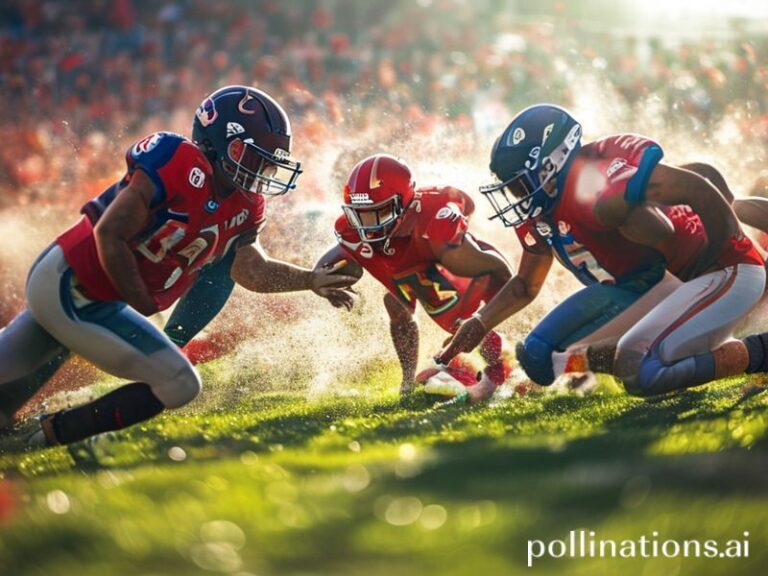Match of the Day Goes Global: How a BBC Football Show Became the World’s Most Watched Therapy Session
Match of the Day: A Global Spectacle, Sponsored by Existential Dread
By Our Foreign Desk Correspondent, somewhere between the bar and the abyss
LONDON—Somewhere in the bowels of Broadcasting House, the BBC’s flagship football digest rolls off the production line every Saturday night like a precision-guided missile aimed squarely at the nation’s collective sofa. But “Match of the Day” is no longer merely a domestic ritual for Britons too knackered to stream a second bottle of Shiraz. In an age when the Premier League’s rights are hawked from Lagos to Lapland, the programme has metastasized into a planetary campfire—an oddly soothing reminder that, whatever else is collapsing this week, 22 millionaires can still chase a sphere of polyurethane with touching sincerity.
Consider the viewing figures: 3.2 million inside the UK, another 8.7 million on illegal Chinese streams, plus an unquantifiable horde in the Gulf states who have already watched the entire match live but tune in anyway to savor Gary Lineker’s pun-heavy segues. That global congregation is the soft-power equivalent of a low-grade nuclear deterrent. When Lineker archly raises an eyebrow at a contentious VAR call, dictators in four time zones flinch—because even strongmen know that a poorly timed handball can trend harder than their latest five-year plan.
And yet the show’s real genius lies in its studied neutrality. The pundits—ex-pros who once kicked lumps out of one another—now sit in immaculate suits, murmuring boilerplate about “game management” and “high defensive lines,” as though geopolitics were not currently being managed by equally clueless ex-players on a far larger pitch. The banality is deliberate; it is the televisual equivalent of a weighted blanket for a species that has agreed to pretend tomorrow will arrive on schedule. Viewers from Jakarta to Jackson, Mississippi, find solace in the same anodyne phrases: “He’ll be disappointed with that,” “You’ve got to hit the target,” “At this level, you get punished.” Translation: existence is error-strewn, entropy always wins, but at least someone else is paid more to screw up.
The irony thickens when you realize the players themselves are multinational brands in open revolt against linear time. A Senegalese winger clocks off in Manchester, Facetimes his nutritionist in Turin, then flies to Dubai for cryotherapy—all before Alan Shearer can say “top bins.” Meanwhile, fans in Nairobi huddle around a cracked smartphone, praying the buffering wheel will spin faster than the local inflation rate. Globalization’s grand bargain: your misery is monetized in sterling, repackaged in 4K, and sold back to you for the price of a monthly subscription you can’t really afford.
Over in the United States, NBC’s simulcast has begun inserting bespoke ad-breaks that pair artisanal bourbon with tactical replays. Somewhere an algorithm has decided that Kentucky whiskey and Sheffield United’s defensive frailty are psychographic twins. Americans, bless them, still think “nil-nil” is a polite euphemism for “nothing to see here,” yet they watch anyway—drawn, perhaps, by the comforting spectacle of failure that doesn’t involve Congress. Even the Canadians have joined in, politely requesting fewer swear words so the broadcast can air before watershed without causing a parliamentary apology.
And then there is VAR—football’s answer to the TSA. Every marginal offside is now scrutinized down to the molecular level, a process that satisfies no one and delays gratification just long enough for viewers to remember the climate crisis. Yet we submit to the freeze-frame tribunal because delayed justice feels reassuringly bureaucratic, like waiting for a visa that will probably be denied. Besides, arguing about VAR on Twitter has replaced arguing about tariffs, so in a sense the Premier League is doing its bit for world peace.
As the credits roll and the theme tune—composed in 1970, back when the planet still had glaciers—fades out, the planet’s disparate insomniacs share a fragile communion. Somewhere a cabbie in Mumbai exhales, a nurse in São Paulo smiles for the first time in 12 hours, and a teenager in Kyiv forgets the air-raid siren for exactly 147 seconds. Tomorrow the markets may crash, the sea levels may rise, and the pundits will still be debating whether it was a “stonewall pen.” But tonight, for one gloriously inconsequential hour, the world agrees on the offside rule. And that, dear reader, is the closest we get to a multilateral treaty these days.







